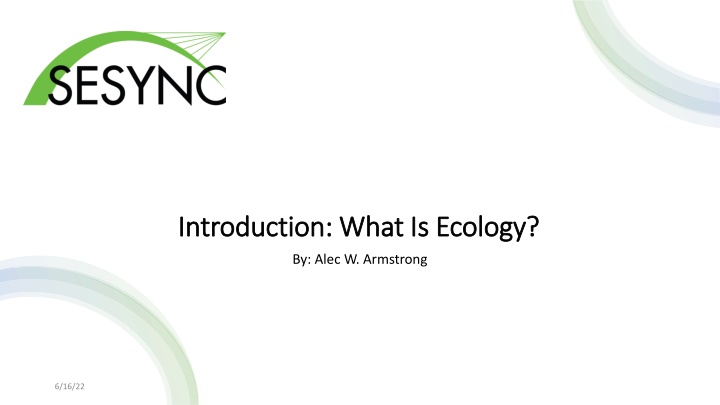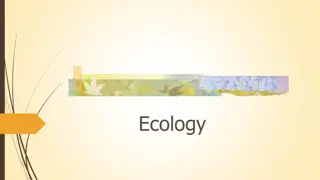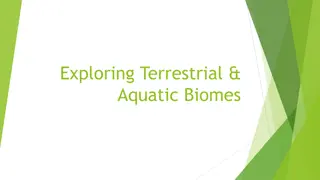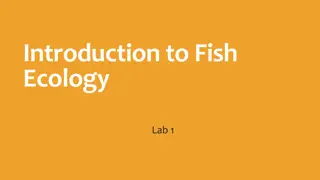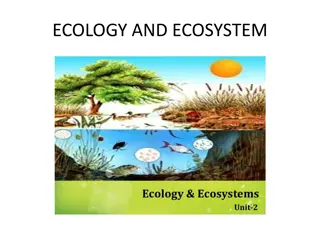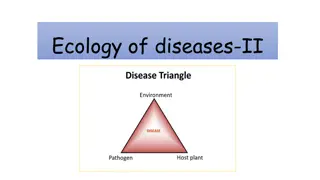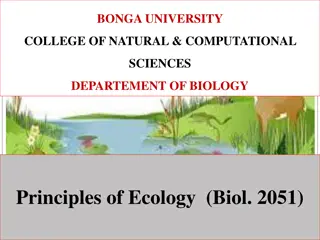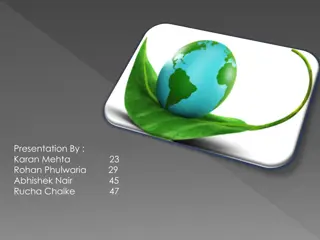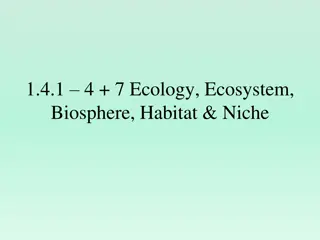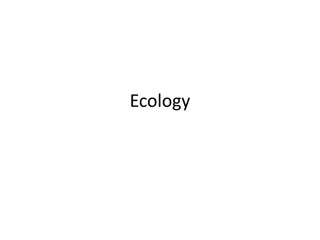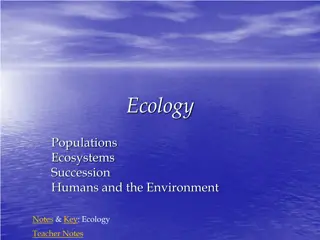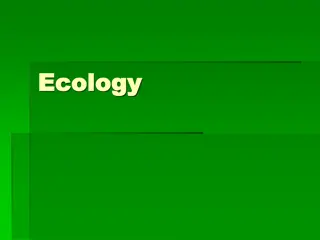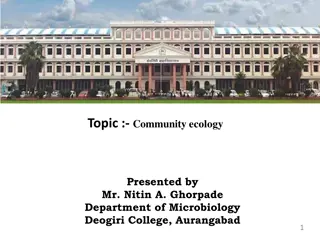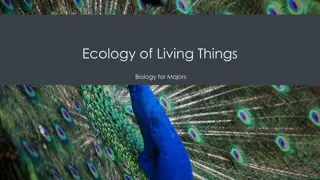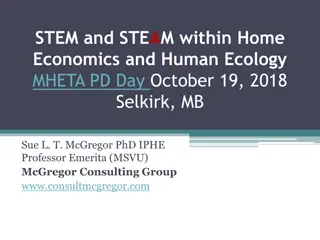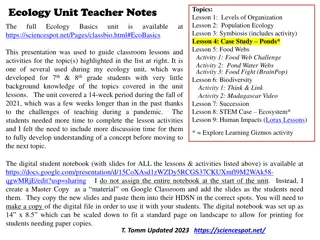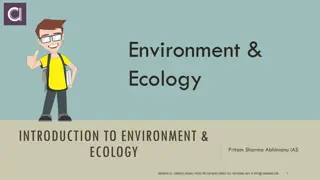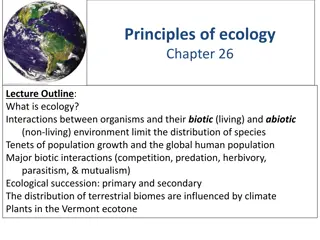Ecology: Concepts and Scope
Ecology, a science focusing on organism-environment interactions, encompasses various scales from individual organisms to ecosystems, examining distribution, abundance, and nature's structure. Explore concepts like autecology, populations, ecosystems, and understand the growth rates of plants and their interactions in ecological settings.
Download Presentation

Please find below an Image/Link to download the presentation.
The content on the website is provided AS IS for your information and personal use only. It may not be sold, licensed, or shared on other websites without obtaining consent from the author.If you encounter any issues during the download, it is possible that the publisher has removed the file from their server.
You are allowed to download the files provided on this website for personal or commercial use, subject to the condition that they are used lawfully. All files are the property of their respective owners.
The content on the website is provided AS IS for your information and personal use only. It may not be sold, licensed, or shared on other websites without obtaining consent from the author.
E N D
Presentation Transcript
Introduction: What Is Ecology? Introduction: What Is Ecology? By: Alec W. Armstrong 6/16/22
What is ecological in this image? What concept, idea, pattern, phenomenon, etc. do you see here that seems like a properly ecological thought? Examine the image and write down your response (>5 minutes). 1
What Is Ecology? What Is Ecology? Usually defined in terms of its scope which parts of the world it studies Ecology = oikos + logos Haeckel s oecology (1866): The whole science of the relations of the organism to the environment including, in the broad sense, all the conditions of existence. Quoted in Egerton 2010 2
What Is Ecology? What Is Ecology? The scientific study of interactions between organisms and their environment (Cain, Bowman & Hacker 2011) The study of relationships between organisms and the environment (Molles 2005) Attempts to narrow the scientific study of the interactions that determine the distribution and abundance of organisms (Krebs 2001) and broaden the study of the structure and function of nature (Odum 1963) but definitions above are most common and persistent (from Reiners & Lockwood 2010) 3
What Is Ecology? What Is Ecology? Many subdisciplines, changing emphases through time Subfields often defined by scale of organization and focal entities Individual organisms (autecology) Populations Communities and meta-communities Ecosystems Landscapes (or spatial ecology) Interactions between entities can be studied at any of these scales 4
Ecology can focus on individual organisms/species and their interactions. E.g., these lupine plants 5
Ecology can focus on individual organisms/species and their interactions. E.g., these lupine plants What determines the growth rate of individual plants? What interactions exist between the lupines and the valerians (white flowers)? How does a lupine s ability to fix atmospheric nitrogen affect its distribution? 6
Ecology can focus on populations e.g., the collection of lupines shown here. 7
Ecology can focus on populations e.g., the collection of lupines shown here. How many individual lupines are there in an area, and how does this change from year to year? What lupine traits affect population size and stability? How, when, and where do herbivores alter lupine population sizes? 8
Ecology can focus on communities e.g., all the plants in this meadow 9
Ecology can focus on communities e.g., all the plants in this meadow How many plant species are present in the meadow each year? Are there trends over time? How does plant diversity affect things like herbivore population size, or soil nitrogen? 10
Ecology can focus on ecosystems e.g., this meadow 11
Ecology can focus on ecosystems e.g., this meadow What affects the total amount of plant production in this meadow each year? How do events like droughts or fires affect meadow productivity? How does herbivory change soil nutrients over time? 12
Ecology can focus on landscapes e.g., the distribution of meadow vs. forest 13
Ecology can focus on landscapes e.g., the distribution of meadow vs. forest How are increasing temperatures affecting size of meadow areas? Do new pests increase or decrease areas of meadow vs. forest? 14
What Is Not Ecology? What Is Not Ecology? Ecology is Biological but it s not biology Biogeochemical but it s not chemistry or geology Energetic but it s not physics Inclusive of society and human influences but it s not a social science or the humanities Boundaries between Disciplines If there are disciplinary boundaries, who arbitrates them? What are the boundaries between objective science and activism/advocacy? 15
Question to Consider Next Question to Consider Next How do ecologists produce knowledge? What assumptions do ecologists make? What methods do they use? How do these methods influence their work? What ontological commitments do ecologists build upon? How do ecologists evaluate competing claims about the world? e.g., population cycles of snowshoe hares 16
Bibliography Bibliography Philosophy and Definitions of Ecology Cain, M. L., Bowman, W. D., & Hacker, S. D. (2011). Ecology (2nd ed.). Sinauer Associates, Inc. Egerton, F. N. (2012). Roots of Ecology: Antiquity to Haeckel. University of California Press. Keller, D. R., & Golley, F. B. (Eds.). (2000). The Philosophy of Ecology: From Science to Synthesis. University of Georgia Press. Molles, M. C. (2005). Ecology: Concepts and Applications (3rd ed.). McGraw Hill. Odum, E. P. (1963). Ecology. Modern Biology Series. Holt, Rinehart, and Winston. Reiners, W. A., & Lockwood, J. A. (2010). Philosophical Foundations for the Practices of Ecology. Cambridge University Press. 17
